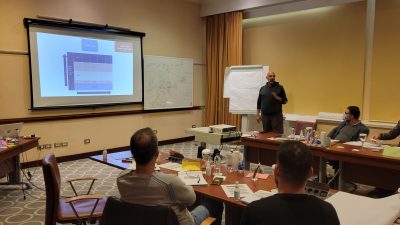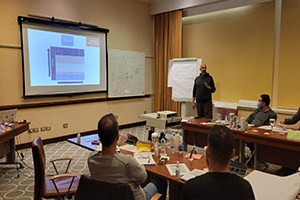
TDA trained 8 survivors of the Roumieh prison in Lebanon, on the mechanisms of international accountability and international laws, advocacy and speaking to the media, and documentation, its types and benefits — with the aim of raising their capabilities and enabling them to advocate their cases legally and in an organized manner.
In order to familiarize the survivors with the history and how the international accountability mechanisms work, the survivors were trained on international accounting mechanisms and international laws. TDA’s Legal Advisor, Anwar Al-Majanni, explained how national courts work, how they were established, and the laws they carry out. He also explained how the International Criminal Court was established, and the international mechanisms associated with it. He further explained the function of the independent mechanism and its role, and the reports it publishes, as well as the work of the International Committee of Missing Persons. The trainees were introduced to cases brought before European courts, such as cases in Germany, Austria, Sweden, France, and Norway. Details of the cases against Anwar Raslan and Iyad Gharib in Koblenz were discussed, and the types of charges filed against them.
Human rights defender, Nadine Abdeen, discussed how the International Investigation Committee’s originated, its competence, those responsible for it, the reports it issued/published, and its impact.
TDA further trained the survivors of Roumieh prison on ways to document the violations they were subjected to, within a clear and systematic legal mechanism.
Over the course of 3 days, the trainer, Nadine Abdeen, explained to the trainees what documentation was, its types and benefits, with an explanation of the documentation mechanism and its components. The training also included sessions on how to preserve evidence from being lost or forgotten, and how to help achieve justice in the future through trials, identify patterns of crimes, places where they were committed and those responsible, and how to use information in scientific research and public reports.
In order to advocate for the needs and issues of Syrian detainees in Roumieh prison, journalist Ahmed Al-Mahmoud trained the survivors of Roumieh prison on the concept of mobilization and advocacy campaigns, and the steps of designing and implementing campaigns, so that female and male survivors of detention have the necessary skills and tools to help them advocate for their issues and convey their voices to decision makers, and to the local and international communities.
